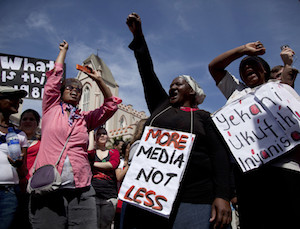On 19 October 1977, the apartheid government in South Africa banned The World, the Weekend World and arrested the newspapers’ editor Percy Qoboza. Pro Veritate, an ecumenical newspaper, was also banned.
The day was named Black Wednesday and is commemorated every year. It serves as an opportunity to take stock of how the country is faring when it comes to press freedom.
Since the end of apartheid South Africa has made great advances when it comes to freedom of the press and freedom of expression in general. The situation today is a far cry from the apartheid era.
Freedom of expression is firmly embedded in the country’s constitution which provides for the “freedom of press and other media”. It also enshrines the right of access to information.
Legislation, such as the Promotion of Access to Information Act has been put in place to underpin these constitutional rights. It provides for access to any information held by the State or private person. This practically means that the Act provides the media with information on how government is run.
This in turn may very well have a bearing on elections and therefore significantly influences a democratic state. As the country’s Constitutional Court has stated:
Access to information is crucial to accurate reporting and thus to imparting accurate information to the public.
Contrary to the secretive apartheid regime, the Promotion of Access to Information Act promotes a culture of responsiveness, transparency and accountability in government.
Impressive as that might be, things do not work as well in practice. South Africa has been dropping in press freedom rankings. Reasons for the decline include the fact that access to information for the media has been slow and is often hampered by bureaucracy. And in only a few cases have access to information applications resulted in full disclosure of information.
While there’s reason to celebrate the improvement of press freedom in a number of southern African countries, South Africans have reason to worry. The Freedom of the Press Report lists South Africa as being among the countries with one of the biggest declines in press freedom, dropping four places. It is now being seen as only “partly free”.
Progress so far
In the 2015 World Press Freedom Index, southern Africa was ranked as the second most improved media environment in the world with Namibia being a real success story.
In other parts of Africa Ghana is still faring well (despite dropping in rankings). Countries in West Africa, such as Burkina Faso, Cȏte d’Ivoire and Togo showed encouraging improvements.
According to another survey, the Freedom House Freedom of the Press Report 2015, South Africa ranks at number 39 of 180 countries, and within Africa, it ranks lower than Cape Verde, São Tomé and Príncipe, Mauritius, Ghana and Namibia.
So, while there has been a general improvement in press freedom in the southern part of Africa in 2015, South Africa’s decline in rankings is a cause for concern.
Free to say what they think?
In his 2014 Black Wednesday commemoration speech President Jacob Zuma emphasised that the “country is run by a government with leaders who fought for these rights” and because of this they should be trusted to “never deny our people the right to say what they think”.
But, the ANC government proved that merely being the liberation party does not exempt you from violating the rights of others. A study by Afrobarometer shows that people who indicate that they are free to say what they think also report lower levels of corruption and better government performance.
South Africa has shown that high government corruption can be equated to lower press freedom in attempts to cover-up corruption. One example is the use of legislation from the apartheid era to hinder any critical reporting on the use of public money on President Zuma’s private homestead at Nkandla. This serves as a clear contradiction of Zuma’s 2014 speech.
The controversial Protection of State Information Bill is also a threat to access to information. Better known as the ‘Secrecy Bill’, it carries prison terms of up to 25 years for the disclosure of classified state information.
Another punch in the face of freedom of expression is the proposal by the Film and Publications Board to regulate online content.
But the most saddening has been the South African Broadcasting Corporation’s open display of bias towards the governing ANC. Examples include its refusal to allow political advertisements of opposition parties and directing journalists not to ask Zuma difficult questions.
Liberating party loses sight of its roots
South Africa’s challenge is that the government is slowly crossing the bridge from liberating party to being a threat to democracy.
A mediocre democracy would be happy with being ranked “partly free” for media freedom. But, that is not in keeping with the robust democracy that many fought for South Africa to become.
As the country commemorates Black Wednesday and celebrates press freedom, South African would do well not to forget what it took to gain such freedom, and the work that lies ahead to maintain it.
If the South African government continues down the slippery slope of corruption and censorship, it will only be a matter of time before its “partly free” media freedom status degenerates into “not free” – just like it was during apartheid.
Georgia Alida du Plessis, Research Fellow in Public Law, University of the Free State
This article was originally published on The Conversation. Read the original article.
Image: Media freedom activists protest against the draconian Protection of Information Bill in Cape Town, South Africa. Sumaya Hisham/Reuters














